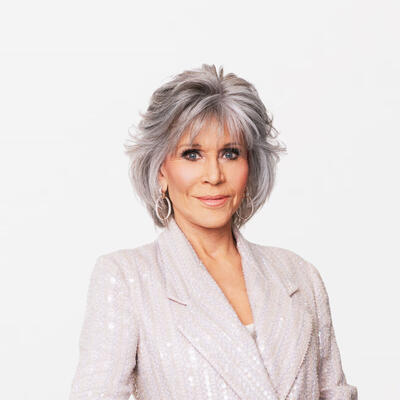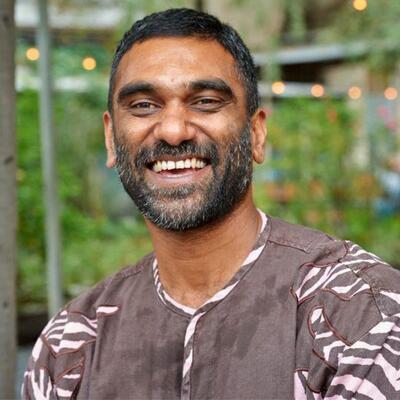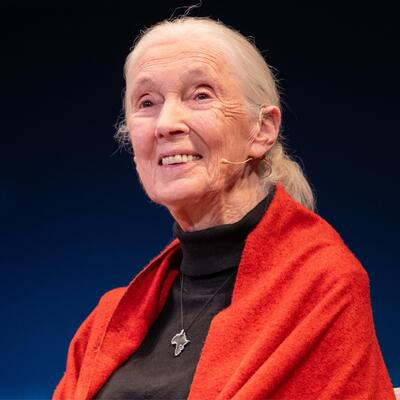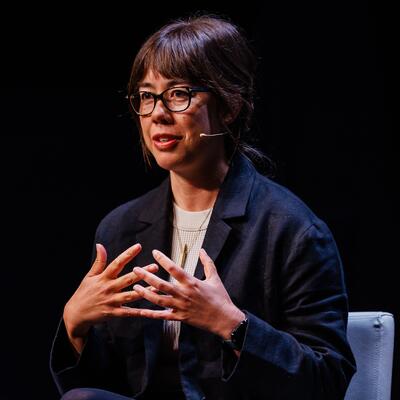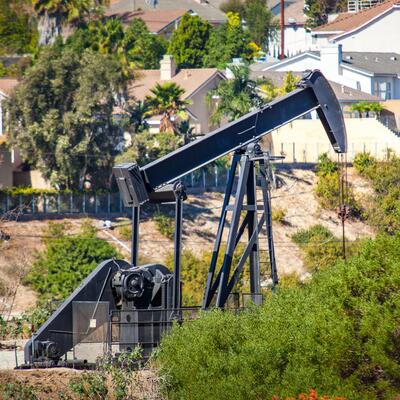
Erin Brockovich: Superman’s Not Coming
Guests
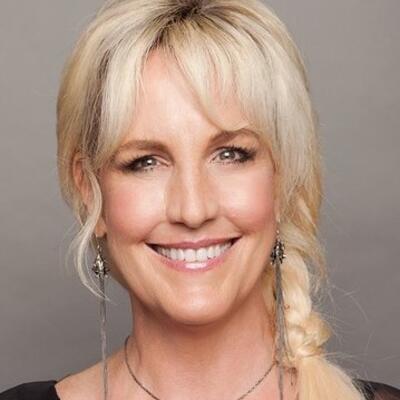
Erin Brockovich
Summary
Twenty years ago, Julia Roberts won an Oscar for her portrayal of maverick environmental activist Erin Brockovich in the biopic of the same name. The film depicted Brockovich’s successful crusade against corporate behemoth Pacific Gas & Electric, which had been pumping contaminated wastewater into the water supply of the town of Hinckley, California.
Thanks to the film’s success, the real Erin Brockovich was hailed as a populist hero and became a national celebrity. And she hasn’t slowed down since then - in fact, she’s out there writing the sequel, taking on corporate polluters and government enablers from upstate New York to Flint, Michigan to Beverly Hills, California. Much of her work centers on empowering under-served and overlooked communities to collectively advocate for themselves. And that can start with just one person.
“It will be you the person where it starts, to own where you want to go with your cause,” Brockovich maintains. “You'll need the tools and steps to know how to fight. But when that collective comes in that’s where it can make a difference.
“Don't think that some magical oversight will trickle down to you to change the effects in your own backyard. You do that; your community does that.”
These days, in addition to her work on water safety and toxins in communities, Brockovich has taken on the climate emergency. The issues are deeply connected, she says.
“Climate change is about too much water, not enough water, no water, drought, flooding,” she says. “I think it's becoming real because it's tangible, it's touchable. You're running from it, you’re breathing it. You're swimming in it. You could be drowning in it. I just think it's here.”
Superman’s not coming to protect our water or environment, writes Brockovich in her latest book — and neither are corporations, politicians or the “gutted” EPA. “Climate change will be about our response, our preparedness, our defending ourselves,” says Brockovich. “And not just thinking that because you can’t see it, it’s not going to happen.”
“We’ve got to stop kicking the can down the road,” she continues. “Have the conversation, look for the solutions, be prepared, work together, follow through on that. And we have ways to defend ourselves.”
Full Transcript
Greg Dalton: This is Climate One. I’m Greg Dalton.
Twenty years ago, Julia Roberts won an Oscar for her portrayal of maverick environmental activist Erin Brockovich. But the real Erin Brockovich hasn’t slowed down since then - in fact, she’s out there writing the sequel, taking on corporate polluters in communities all over the country.
Erin Brockovich: When they are telling you, the very people breathing it, drinking, experiencing it… why do we not look and listen? Because right there, you’re learning something. [:12]
Greg Dalton: These days, in addition to her work on toxins in communities, Brockovich has taken on the climate emergency.
Erin Brockovich: Climate change is about too much water, not enough water, no water, drought, flooding. [:08]
Greg Dalton: And as she warns us in her new book - Superman’s not coming.
Erin Brockovich: Climate change will be about our response, our preparedness, our defending ourselves… and not just thinking that because you can’t see it, it’s not going to happen. [:12]
Greg Dalton: Erin Brockovich. Up next on Climate One.
Break
Greg Dalton: Can a regular person take on powerful corporations and systems?
Climate One conversations feature stories of personal change and changes in our economic, political and energy systems. I’m Greg Dalton.
On today’s program, an unfiltered conversation with an environmental icon.
[Start Playback]
Male Speaker: Erin Brockovich became a household name when a film about her fight for a small town was released on the big screen 20 years ago.
Female Speaker: The movie tells the true story of a single mom’s fight to get justice for victims of corporate environmental pollution.
Male Speaker: Julia Roberts played the tough and relentless paralegal who brought PG&E, Pacific Gas & Electric to its knees.
Female Speaker: These people don’t dream about being rich. They dream about being able to watch their kids swim in a pool without worrying that they’ll have to have a hysterectomy at the age of 20.
Female Speaker: Today, Brockovich is on a new case, this time in Midland, Texas.
Male Speaker: You’re a real-life superhero. You’re like “Water Batman.”
Male Speaker: A cancer cluster in northeast Houston is getting the attention of well-known environmental advocate, Erin Brockovich.
Male Speaker: She’s getting involved in the crisis in Flint, Michigan. How did you first find out about it?
Female Speaker: From the community. About a year ago they contacted me.
Female Speaker: We will fight water pollution we will fight air pollution. We will find our way.
[End Playback]
Greg Dalton: In her new book, “Superman's Not Coming: Our National Water Crisis and What We the People Can Do About It,” my guest Erin Brockovich talks about taking the fight for clean water to communities throughout the country. Lately, she’s been focusing her unique brand of inclusive, uncompromising, can-do activism on the climate crisis.
PROGRAM PART 1
Greg Dalton: Erin Brockovich, welcome to Climate One. It’s great to have you here.
Erin Brockovich: Hi, it’s really nice to be here. Thank you. And I wanna share with everybody up north and the whole state of California and Oregon and I hope you're staying safe and well. And it's a rough time so I hope everybody is taking care of themselves.
Greg Dalton: You write about how fossil fuels are disrupting where people live, how they live. And I've been thinking about climate change full-time for 13 years. There’s something different about when we start to breathe it into our lungs. And I’d like to hear how experiencing climate change is different than anticipating climate change.
Erin Brockovich: That’s an excellent question, because we are experiencing it because it's not an isolated situation in one country or one part of the state. It’s now just it's becoming everywhere. And seeing is believing. I think climate change has been something that's been difficult for people because you can't really see it. You know, we think of climate and its air and where is it. That reminds me when I was out in Hinckley and I was looking at the two headed frog and the green water. And that visual meant everything to me. And so, I talk about climate change a lot and I had a picture that was sent to me two days ago up in Chico at noon. It was dark but yet it was orange. It was a moonscape. If you don't know what climate change is that picture shows you.
And we’re visual most of us are. And what's happening now for all of us we’ve seen the fires in Australia. We've certainly experienced them on the West Coast. And I let people know if you can think of it as a weather phenomenon because you can almost visualize a tornado or a hurricane or a fire and what the climate change and the global warming has done. And I let people know because they don't always see it. Somebody asked me but what is water have to do with climate change. And I’m like okay well that's an excellent question. I'll try not to be frustrated because I’m like oh my gosh climate is water and that is something that I hope you visualize. I mean part of what’s happening here is we’ve been in this drought. And so, we have less water. We talk about it in the book you know in Johannesburg, South Africa they were literally gonna have no water. So, climate change is about too much water not enough water, no water, drought, flooding. And the conversation is really gearing up and it's always been there. But I believe the conversation is getting bigger because it's affecting everyone and they’re actually visually experiencing and seeing a result. And it can be suffocating and it's frightening and the losses can be great.
So, I hate to say it, the movie Twister and I don't know who saw it, but Bill Paxton is waiting, watching the storm coming. And one of his workers comes up and is referencing, oh, you know, you can see it. He says, oh my gosh it's coming. And Bill Paxton that moment stopped and he said it's already here. And so, I think it's becoming real because it's tangible, it's touchable. You're running from it you’re breathing it. You're swimming in it. You could be drowning in it. I just think it's here. And I know that sounds dramatic but it is dramatic. \
And I'm often struck with Rachel Carson and again I quote this in the book Superman's Not Coming. But she talks about how man has the fateful power to alter nature. And that’s a battle that will not be won by us and instead of trying to continue to alter that, rather, we look to ourselves and master and alter our responses, our solutions and our actions. And it just amazes me that she said this in 1963 and what was happening in the 60s and where did we not hear or heed a warning and how we get better at that because climate change will be about our response our preparedness, our defending ourselves. And not just thinking that because you can't see it that it’s not gonna happen.
Greg Dalton: So does that mean the power is inward? Because so much of climate and environmentalism is about changing people's minds, changing other people, changing other parties, other states etc. So, am I hearing you say that like work inward first for power and change rather than shaming oil companies or Republicans or things like that?
Erin Brockovich: Absolutely. I mean it would be foolish for us to think whether you're Republican or Democrat you can or can't be involved in this issue or that industry or the fossil fuels can't. This will be something that collectively we got to drop that and work together. And I think that the threat or finger-pointing or the name-calling all of that isn’t serving any purpose other than getting two sides to stand down. And I want to find a way to break through that. We all going to have to have a seat at this table. And here's the thing that I think that’s frustrating. We do have the technology and companies can step in here and work with the people. \
And so, it’s an inward moment where you're like, okay I’m not gonna engage in this but I am gonna engage in how I can get you to come together to work together for a situation on this planet that will affect us all. It doesn't matter what your party affiliation is it doesn't matter if your industry or we as a community what's going to matter is that we recognize it would stop with the name-calling. Somebody just, you know, put the sword down and let's work collectively we have to be collective on this issue for the entire planet which is the entire human species.
Greg Dalton: And our country recently had a real racial reckoning and awakening with the embedded racism, structural racism in our country today and in the past. I’d like to ask you about in 2017 the Pawnee Nation filed a lawsuit against more than 25 oil and gas companies operating wastewater injection sites near their homes in Oklahoma, a state that’s very dear to you. What’s that case about and what’s its significance?
Erin Brockovich: Well, I think the biggest significance is, you know, we definitely see these communities that haven't been heard or that we’re not listening to them. They feel suppressed and oppressed and socioeconomic factors. And there's a whole host of reasons, whether they don't have access to computers or school or education that they've been underestimated and set aside. But they're starting to really collectively find their voice. And the Pawnee Nation was terribly affected by the earthquakes that was coming from the fracking and left and forgotten. So, I work with the law firm Weitz & Luxenberg that had gone out there to help represent them. And we see these issues, playing themselves out in fracking is oh my gosh there's so much that people don't know about fracking and we talk about that in the book.
The book is so important because I feel we’re able to talk in a layman's term so that you can understand it because once we understand it, and we get it we’ll take action. And the Pawnee Nation was terribly devastated and their water has been impacted and they feel very forgotten. And we’re in a moment where they're speaking out, we’re all starting to see it. I’ve seen it on the ground for 20 years and it’s very hurtful. And what happens is somehow they get convinced that their voice won't matter and they’ll back off for a while. And out of fear and feeling less than and how they've been treated and that just simply has to stop. And again, like climate change, we have to see and that has been my gift to me to be on the ground and to be able to be with them and see and touch and know that this is happening. And their voice they're starting to find that and they're starting to they're also getting support, you know, that is very key. That they have the support of us or the support of a community. So, they were very impacted and that lawsuit is still ongoing to try to get recovery for them because they were devastated by earthquakes and they’re being devastated by the pollution caused by fracking.
Greg Dalton: How have you benefited from white privilege?
Erin Brockovich: Oh my gosh, I've been blessed in so many ways. I was born and raised in Lawrence, Kansas, and I was blessed to enjoy the freedom and outdoors. Certainly, at the time blessed to have clean water access to good health, education. I've been beyond blessed. And every day in my line of work is when I do go out there and see that especially when I was blessed with clean water and clean land and clean air and we all deserve that. My father was a very one that taught me, he was a Republican man from Kansas and he ran the pipelines. And I know he saw things and he taught me that the greatest gifts we all have everybody is clean water, clean land, our air to breathe, our health and our family.
Greg Dalton: One day Lori Popp turned on the tap in her home in southern Arizona and brown water came out. What’s her story and how is that a cautionary tale?
Erin Brockovich: Oh well it’s a big one. So, in the book we share a collage of photos that come in; they’ve come in from every single state in the United States and multiple cities. And green water, I'm telling you is chromium-6, I've not been wrong on that. We've had a -- you could argue with me about that all day and I’m gonna tell you, nope, chrom-6 and I can tell you right around one ppm what color it's going to be. It has a color in water. And then when we see the brown waters and the dirty waters, the blackwaters, often times we have oil and gas issues. We have tank farms that are leaking, they’ve come into their backyard, people on well water. But generally, across the board we’re seeing these water colors because we’re adding ammonia to the system. And we’re not treating the dirt appropriately at the municipality.
And what's worrisome about those photos is generally often in there is lead. We have 18 million miles of pipeline, of lead pipeline, that we need to address our infrastructure. So, regarding that color of the water, it’s telling us several things. Infrastructure issue, pollution issue, bacterial issue, lead issues and that the water is not being treated appropriately at the municipality.
So as water comes in it has dirt in it, right? And they have to add chlorination because we don't want to have E. coli outbreaks and things like that. But what a lot of people don't know and here's a big message. We need to know our water. We need to understand water and when we do it changes everything. So organic matter and chlorination create a very toxic compound known as trihalomethane which is very regulated by the Safe Drinking Water Act. Now, if we would follow the Safe Drinking Water Act when we can't balance the system and can't keep our THMs controlled is the appropriate filtration system. But we don’t like to do that because we wanna do things cheap and take these shortcuts. We can't take shortcuts on water.
So, adding ammonia to the system can reduce chlorination less effective. And then we have a whole situation happening in the distribution system which most people don't realize is unregulated! A lot of stuff goes on in there. But when the water becomes corrosive and you have lead pipes. It causes the pipes to pit and all the iron and the manganese leaks out. That's often what you're seeing when it's coming out of the pipes but come with it, is the lead. So, the lead is a huge issue. And if we could change adding ammonia and follow the Safe Drinking Water Act and guidelines for filtration, we would save infrastructure which is in great need of repair. We all know we’re going to have to do something about our infrastructure and we would have less lead contamination and less Legionnaire outbreaks. We are definitely seeing more Legionnaire outbreaks. We are definitely seeing more lead contamination.
We’re working on the lead and copper rule. Congressman Dan Kildee has been amazing with that up in Flint, Michigan. And this was a policy written a long time ago that said you could test for lead in water once every four years and average the sample. What? We're gonna be missing a whole lot of stuff going on.
So, for the person that sees that color of water generally, that is one of the number one cause of why you're seeing that discoloration of water. We really need to get back to basics. We need to on the upfront take care of our infrastructure, safety, and people first.
Greg Dalton: Speaking of lead we have a question from listener David Romano who asked about artificial turf, replacing grass on playing fields. And lead is a concern there, some of those things are made from old tires. Your take on artificial turf as a replacement to natural grass?
Erin Brockovich: That is a great question. I've had many soccer moms come to me whose kids had been on artificial turf and the PCBs and the lead and the mercury and a whole lot of issues going on and off gassing and children and those playing football on soccer down on that ground with cancer. So, there are some big studies going on. I'm aware of some communities. I'm working with them. And this is gonna be one of those situations where there’s probably gonna be some lawsuit that’s gonna push back on that they can be very dangerous. And I’m really so glad somebody asked that, that was out of the blue. You are correct. And we just be better off playing on good all-natural grass. So, there are issues and I think that’s something that many universities and schools and as we learn more and we talk about this more that we’ll stop doing that.
Break
Greg Dalton: You’re listening to a Climate One conversation with author and activist Erin Brockovich. Coming up, passing the torch - figuratively and literally.
Erin Brockovich: Boom! I got a hold of it. The minute I did, it was like, YES! I mean it just became powerful...and it is what I so want to do is pass that torch to everybody. [:15]
Greg Dalton: That’s up next, when Climate One continues.
Break
Greg Dalton: This is Climate One. I’m Greg Dalton, and we’re talking about environmental advocacy with Erin Brockovich.
In 2003, the law firm that Brockovich worked with filed suit against Beverly Hills Unified School District over a cluster of oil derricks that were located on school campuses. The case wasn’t proven, and was eventually dismissed. But since then, she says, the story has taken a surprising turn.
PROGRAM PART 2
Erin Brockovich: Beverly Hills School District has recently come back to me and asked me to help. Because they have removed the oil derrick, we were right about that issue there's a lot of directional drilling that goes on. It's like a whole world under there. The number of kids coming from Beverly Hills High, in a timeframe of about 10 Years is way more than 300 it's over a thousand. So, I don’t make this stuff up and we need to look at these patterns and these numbers and they’re all in the same location and they all have cancer. That's something that it needs to be looked at.
And so, at the time they were assuming or believing that the oil derrick was causing these issues. And I did a lot of testing in that area with Summa canisters and we were finding high levels of benzene, but the science became a big argument in court. And so, it ended up settling and I believe had we focused on the hexavalent chromium and the cooling tower you would've started seeing a better correlation of these illnesses. So, this is a school that had an oil derrick on it and Sempra Energy right on top of it. The oil derrick has now been removed. But guess what, they have a big problem now because once it's been removed, they are quite well aware they have a huge methane issue. Huge. And what they’re concerned about is the subway that's going to come through and underneath that school. What could happen?
You know, it just doesn’t make sense to me. LA, at one time I believe was what, the third largest oil reserves in the U.S.? It was just nothing but oil derricks. That oil and crude and it seeps out is in the ground in the environment under the school high levels of methane that thinking building a school on top of that, having your children at school on top of that, and now running a subway under it with potential methane explosion and or issues just isn't a good idea. And parents should know that information and so they can better defend their children.
Greg Dalton: Well, more than 17 million Americans live within a mile of an active oil or gas well. California Democratic Senators recently killed a bill to ban oil and gas drilling within 2,500 feet of schools and some of those Democratic senators, including Bob Hertzberg, Anna Caballero and Bob Hueso received nearly $150,000 from oil and gas companies. Ventura County, I don’t know if that’s where you are, just passed a 2,500-foot setback for oil well. So, this has been a national issue in Colorado other places trying to get some kind of a buffer zone. Where do you see the status of that buffer zone around oil and gas wells particularly schools?
Erin Brockovich: I think we should and I think that you're going to see more about it and more better result with that because the moms are starting to speak up. And that is one thing that is a big, huge game changer. When the moms and it’s always a mom she's like, I don't like that I don't like an oil well. You don't even have to sit here and get into a scientific debate on the issue. It's an oil derrick it’s an oil field it’s an oil pipeline. We know what oil is there is betex in there, you worry about benzene you worry about off gas and you worry about an accident. You just don't want it in that close proximity to your children and the school. So, I think that real change will come from the conversation, the rise of moms, the rise of rising parents, the rise of community, getting in even at a local city council level and saying, this is what we want and this is frankly what we’re going to demand for the safety of our children.
Greg Dalton: We have another question from Vanessa Caroline, listener. She asked, in addition to fighting the good fight for changes in our water rules is there a way to protect ourselves in our homes from questionable municipal water? Water purifiers, what can an average person do about the water in their home?
Erin Brockovich: That’s a great question. And one of the first steps we tell people is know your water source, know your municipality. And if you haven't been getting a water quality report in your bill you need to call them and you need to get them. We can’t tell you what to filter, what filters to buy if you don't know what's in your water because each chemical responds to a different you know, resin or carbon or coconut shell. We've always said reverse osmosis can be one of the best ways to protect yourself at home. Whether it’s a home system, countertop system, under the sink map. There are concerns with that that the minerals are taken out. You can add the minerals back. There is definite question as you dispose of the reverse osmosis canister that the chemicals or compounds that are in there, how we dispose of them. But it is one of the safest ways to protect yourself at your tap.
Know your water, know what's in your water, then you can begin to make the appropriate steps on what type of filtration that you would need to have at your home to better protect yourself.
Greg Dalton: In Flint, Michigan kind of the iconic water contamination story with a lot of racial discrimination recently there’s a $600 million settlement with 80% of the funds going to people who were under 18 at the time of the crisis. Is that a just settlement in your view?
Erin Brockovich: You know, I see these communities, I still talk to people out in Hinkley. Yes, the money and that settlement is a form of justice. In Flint, having a grand jury and those that knew and said nothing to see them be sentenced, to be reprimanded for that egregious behavior, has been some justice. The national attention, and the media and the story rising has been some justice. And when they get the money yes, it feels like some justice but it's very bittersweet because the scars are left, especially for the children at Flint and their future, neurological problems or learning disabilities. And the money is there to help how we can how the family can get them the appropriate care that they need or tutoring that they need and getting them on with life. And for them ultimately justice would have been that this never happened. Everybody in Hinkley feels the same way. What good is the money going to do you when I have cancer and I'm going to die.
You know, in Flint, they switched river waters. Flint was a perfect storm and in a way PG&E was a perfect storm. PG&E was groundwater, well water. The PG&E Hinkley, California, Erin Brockovich film was a corporation knowing and hiding the information. And this is, you know, my father always taught me deception is the root cause of so many of our downfalls. And in Flint it was another perfect storm. They switched river water and they knew.
That is such a sock in your gut. But the idea that your municipality or anybody in the health department or in an agency all the way up to the governor would in fact not inform you of that knowing children would be harmed is really a slap in the face.
Greg Dalton: Well, a lot of people would say it's about race.
Erin Brockovich: Well, and I can understand that because they underestimated that community, they underestimate the race and they think because of your socioeconomic situation or because you don't have the education or because of this that you're never gonna figure it out. And yes, and they’ve underestimated the situation. And that should – no.
Greg Dalton: Happens a lot in communities of color, it also happens sometimes differently in wealthy communities. The largest natural gas leak in U.S. history occurred in 2015 at a storage facility in Porter Ranch in Southern California.
Erin Brockovich: Aliso Canyon.
Greg Dalton: Aliso Canyon. The impact on the climate was the equivalent to annual emissions from half a million cars. You supported a class-action lawsuit filed on behalf of residents, where does that stand?
Erin Brockovich: That stands in a pretty good place it it’s going through this process and discovery. There are some records coming out that really aren’t very good for the oil and gas company and Sempra Energy. And this is again something that's really good to talk about and it does affect all communities. So, it's moving along it will settle. I was out there I don't live far from there. And the thing that is so frustrating, we need to look at our infrastructure not only in water but our oil and gas and these abandoned fields and what, nobody knows what's going on in there until we have a big disaster like this like you did in Aliso Canyon. This is what Beverly Hills is upsetting. When we know these situations are here, I honestly don't know why we don't plan, prepare, find a solution, fix the problem. Why do we wait for the disaster?
And that's what happened in Aliso Canyon and I was out there other people were out there. Whoever they are, would be Southern Cal gas skeptics, sometimes the media whether we get a sensational moment or not. You couldn't possibly be experiencing that. This drives me crazy.
So, when you have a community like an Aliso Canyon or Beverly Hills or Flint or Hinkley and we could go all over the country. When they are telling you, the very people breathing it, drinking it, experiencing it over a huge dose in a short-term or a medium amount of contaminants over a long range. Why do we not look and listen because right there you’re learning something about the impacts of what that gas and abandoned field water pollution, municipalities not paying attention does to the people because that's where we’re gonna learn. I just honestly, Greg, I go nuts over this. We're talking about poisons. We’re well aware of them. We've studied a lot of them and for us to ingest them and inhale them and drink them just generally doesn't lead to a very good outcome.
Greg Dalton: Europe has the precautionary principle where things have to be proven before they can go in the market. Our system is more like you get away with it until 20 years later there’s enough people who have cancer, you can bring it –
Erin Brockovich: Because it’s ass backwards, it’s an ass backward system and I truly believe that. We talk about it in the book and one of the perfect examples is the PFOA which is most people know as Teflon. PFOS which most people know as the firefighting foam. This is 3,000 different chemicals that have created the PFC family group, they got a family of chemicals. This is exactly what happened and why I just said the system is ass backwards.
3M knew that this chemical was a bad actor and they notified the agency. So, the agency’s created a guideline for hundred parts per trillion and you can run it through your water up to that point we go about our business, right. They commission a study and science takes time. Science can take five years, seven years, eight years 10 years. So here we go about four years ago as is being studied. The conclusions come in. Yup, this causes cancer and diseases. To make matters worse, the study got hidden. You had to fight to get it to come out. Why on earth would we go through that wreak havoc on the environment, the water, human health and life when on the upfront you should be saying I want to see a study first before I put this in the marketplace and expose the people or the environment. I want to see the study first. But we do that at the end, it doesn't make sense.
Greg Dalton: If you’re just joining us, I'm Greg Dalton, at Climate One. My guest is Erin Brockovich. Her new book is Superman's Not Coming: Our National Water Crisis and What We the People Can Do About It.
We’re gonna to our lightning round and ask you, Erin Brockovich, first some true or false questions and then some association.
Erin Brockovich: Oh, no, no, no.
Greg Dalton: So true or false. You wear clothing made with Gore-Tex?
Erin Brockovich: It’s probably gonna be true, I mean, some of the things I’ve put on, you know, until we read the labels we oftentimes don’t know. And I am definitely guilty of that and I’m probably gonna say true. I’ll go in a grocery store and I look at some of the stuff and I’m like, ew, I didn’t even know that was in there.
Greg Dalton: True or false. Your kitchen has pots and pans lined with Teflon or similar no stick coatings?
Erin Brockovich: Well, absolutely there will be and I try to get rid of them because I like cast-iron.
Greg Dalton: True or false. Beauty pageants empower women?
Erin Brockovich: I was in a couple. I’m gonna say no.
Greg Dalton: Association. I'm just gonna ask you, mention a person, place or thing and ask you to get your first phrase or word that comes to mind unfiltered. I don't think we have to worry about the unfiltered part.
Erin Brockovich: There could be a lot of F-bombs getting ready to come out. So just I’m saying, get ready. I’m serious.
Greg Dalton: EPA administrator Andrew Wheeler.
Erin Brockovich: Call me, please. We need to talk.
Greg Dalton: Joe Biden's position on fracking.
Erin Brockovich: I'm not sure. And that’s an honest response.
Greg Dalton: One word or phrase that describes how you felt carrying the Olympic torch in Salt Lake City in 2002.
Erin Brockovich: Oh my God. That is not gonna be the first thing into my head. Scary, amazing, and here's why. And it is what I so want to do is pass that torch to everybody. I was so nervous I didn't know where to run who to talk to. It was raining. Oh my gosh there's cameras here. I wore mascara. What was I thinking, this isn’t about makeup. But I was like just get it, and I’m like I’m scared I don’t want to do this. And so, they told me to start running and pick your pace up and I am and I'm thinking to myself where do I go, what am I supposed to do with this thing, what if I drop it? Or this is just the worst-case scenario. And they said, you need to turn around Erin because it's coming, you need to turn around and get ready. And I’m like, what, and I can hear them go grab it. And I was like, what, and I boom! I got a hold of it. The minute I did, it was like, yes. I mean it just became powerful. But sometimes we’re afraid to grab it or we’re fearful that we can’t do it. And I want you to know once you grab it, you know where to go.
Break
Greg Dalton: You're listening to a conversation about climate change and advocacy with Erin Brockovich. This is Climate One. Coming up - Brockovich has some advice for youth activists: just be yourself.
Erin Brockovich: I don't need to be reminded you’re not a doctor you’re not a lawyer, you’re not a scientist – you’re a girl with blonde hair, your boobs are too big, your dress is inappropriate, what do you know? And I’m like, I don’t have to be any of that to be a human. And to tell you that I have a voice, what I see is wrong, and to stand up.[:20]
Greg Dalton: That’s up next, when Climate One continues.
Break
Greg Dalton: This is Climate One. I’m Greg Dalton. We’re talking with water and climate crusader Erin Brockovich, whose fight for environmental justice was depicted in a 2000 movie starring Julia Roberts.
Before the break, Brockovich was telling us about the thrill of carrying the Olympic Torch on its way to the 2002 Salt Lake City Olympics. I asked her what advice she has about passing the torch to youth activists who want to make an impact.
PROGRAM PART 3
Erin Brockovich: Get involved. And I'm talking to them. I'm working with them. I have one as an intern with me. The biggest message I could give them is everything that we've been talking about here. We label or judge or perceived based on -- it’s like when I started my work in Hinkley, I’m very well aware of who I am, but I don't need to be reminded you’re not a doctor you’re not a lawyer, you’re not a scientist – you’re a girl with blonde hair, your boobs are too big, your dress is inappropriate, what do you know?
And I’m like, I don’t have to be any of that to be a human. And to tell you that I have a voice, what I see is wrong and to stand up. And for our youth, to believe in yourself we let negative noises get inside of our head. And I am so frustrated with this. It doesn’t matter if you're right or left, black or white, rich or poor. You are great and you need to believe in yourself. And once you do or you grab that torch, it becomes a moment where you get more information or little more knowledge or you get a little more confidence or you get a little more support that you just keep going and you just keep going and you just keep going. Don't ever let somebody get inside of your head. That happened to me because I'm a dyslexic. I was labeled stupid and underestimated and all of these things.
We’ve got to stop underestimating people. And often times the youths we don't always listen to because what, they’re the youth. Absolutely not. You’re valued it doesn't matter as I said race, money, I mean. I talk about these assessments. We assess ourselves and who we are based on what? Money, fame, what we drive, really? Let's take a look and assess who we are based on character and our courage and our strength, our persistence, our determination. That is what matters. I don't want anyone to ever forget that because I have seen it too much and I have experienced it where you are oppressed, suppressed pushed back, you don't matter, labeled, judged. Please. We need to stop that.
Greg Dalton: Do you think that being sort of marginalized by powerful people and probably men did that make you more determined?
Erin Brockovich: I just tell them to f** off. You have to laugh, Greg.
[Laughs]
Sure, it does. But I have also learned very early on we need to understand emotions better and the human psychology better and our self-esteem self-doubts. And I do believe when you own that in yourself. These suppressive moments and I've experienced them that you want because, A, you’re uncomfortable or you're not telling me something that you want to project that onto me. And learning how when you know yourself, boom! that protects - I don’t want to say the word Teflon because you know that's just not a good thing. But that's your shield. You own you; you know it and don’t let that projection come back on you. So, when that does happen to me and it took me a long time to learn it. I’m like, huh, why do you feel you need to do that? Because I know who I am but what is that you know or don’t know or hiding. Just be honest. I am not afraid to be honest I’m not afraid to be vulnerable. I'm not afraid to be wrong. And I own that. So, when I do, you go ahead, give me your best shot. And that’s often times where we start to recoil, I’ve been there.
Greg Dalton: You talked about being marginalized as a pretty blonde woman. Were you ever tempted to use that as a tool for your advantage particularly when encountering men?
Erin Brockovich: Unconsciously, maybe, but not consciously, no. As I said, you know, I was in beauty pageants. I didn't like that I didn't care for that. In Hinkley, I was definitely when the film first came out, thrown back a little bit myself, comments about how I dressed. And I’m like well, that wasn't intentional, but if you think and I could see the other side thinking that I'm gonna use that, then okay, yeah, fine. That’s what I do. But if you ever spent a summer in Hinkley, I would've been better off running around naked. It's hot. And the last clothes I had on it was like ugh, all the time. But that struck me. And again, that’s judging me by what I wear. And there’s just some days I feel like dressing that way because I just feel, you know, I don’t know spunky or fiery that day. It doesn't always have some meaning, but this is where the line in the film came from, the 634 you all know what if you saw the film comes from. If that’s what you’re just gonna think of me, okay well then, I’m just gonna throw that right back in your face. Because that’s not what was going on and that’s not what I’m consciously thinking. But I'm not gonna lie to you I am certainly a female, and there's days, you know, I may want to do my hair prettier like, oh I don’t know, this looks kinda good.
Greg Dalton: Yeah, shouldn’t have to feel bad about that.
Erin Brockovich: Right.
Erin Brockovich: You ask great questions. Who knew this was gonna get to come out over my climate conversation.
Greg Dalton: We have a question from listener Angelina Cook. How can disadvantaged rural Alpine communities protect themselves against industrial carbon intensive projects that aim to extract export and deplete local water resources? A lot of bottled water is being sucked out of the ground in communities that don't get much for it.
Erin Brockovich: Yeah, I know there’s a lot of issues with even Nestlé. We have those coming to us. You know, one thing that I do tell people that often times we forget it's really super important is the collective. So, follow the common sense we talk about, which is your logic and start using your leverage. You know often times we think of leverage as oh something really bad or somebody's gonna leverage money or the oil and gas people are leveraging it. You get smart and you leverage your community. There's a great deal of power in there, there's a great deal of support. You can begin to network with other collective communities and then it just gets bigger and bigger and get down to your own city council level. This is super important and people often times don't realize.
First of all, have you ever been in the city council meeting? Because if you show up, they’re usually in there talking to themselves. And oftentimes they may really not know that the community’s got this issue. We need to and when you have that issue like in the Alpine communities and we are seeing this happening. They’re like going, yeah, no I don’t think so. They’re joining with their communities. They're starting to create some ruckus in a good way at city council meetings where many permits can begin and end right at that level.
By way of example, and it's not on this particular issue, but it's the same example. We talk about in Tonganoxie Kansas, the moms. Tyson was coming in with the whole manufacturing plant, they did not want that. They were worried about water pollution. They were worried about what would happen to the community. And I'll tell you what, they geared up pretty fast. They got their facts that knowledge became power. They made it their business to learn it to understand it to join the community, join forces get to city council, work with city council who denied the permit. They ran them right out.
That is the power of people and that is the most important message I have learned my entire life in all my environmental work. It isn't just a person. It will be you the person where it starts to own where you want to go with your cause, you'll need the tools and steps to know how to fight. But when that collective comes in that’s where it can make a difference. Don't think that some magical oversight will trickle down to you to change the effects in your own backyard. You do that your community does that. Get to your city council. I am telling you 10 times out of 10 we are seeing the biggest changes happening right at that microscopic place in your own backyard. Imagine if every one of us did that and every town and city, every city council and began to address these issues and blew it up across America. We’d actually have effect that change and solutions and made that difference.
Greg Dalton: Do you think that’s really true as in the case of the 2,500-foot setback rule in California fossil fuel interests seem to have influenced the Democrats who blocked that rule. You know, if government is bought by corporations it takes a lot of people power to flip the balance.
Erin Brockovich: It really does. You get involved in legislation you got to actually read the bills. It's really very difficult. And this is where I want people to say well, I don't know how to do that or how what I do that or I'm afraid to do that. Because I will pick the phone up all day and say really, because what does this mean? You giveth and you taketh away. And so be vocal and don't be afraid to utilize radio social media, Facebook, Twitter, put it out there put the pressure on and keep the pressure on it. And that makes a very big difference because you really got them in the hot spot. No means no we’re not doing this. They’re banking often times that you go away. Yes, there is an association that's too close if you ask me. Somebody asked me once who's worse corporations or some governmental entities? I’m like I don’t know, maybe they sleep in the same bed. Honestly, it’s hard to decipher that. Keep the pressure on, boom, boom, boom, boom, boom. Keep it on, keep it on, keep it on. Keep the pressure on.
Greg Dalton: As we get to the end, I’d like to bring it back to climate. You write a lot about climate in Superman’s Not Coming. And, you know, the impacts are here, they're severe, they're depressing. If you know the science you know that there’s a lot of momentum built up into the system. A lot of changes will continue. More fires, more floods, etc. even if we shut off all the carbon. How do you hold that, how do you not give up or feel overwhelmed by that? Or do you and then how do you work through it?
Erin Brockovich: Because I believe in people. And I believe we are inherently great. And I believe just born out of our love for our health, our air, our land, our water, our planet, our homes, our country it resides within us to want to rise and to want to fight. There are days that you’re not gonna feel like it. But here's what I want you to do. Give yourself permission. Let me tell you, I’ve thrown myself on the floor and had a fit and said, I am not, I give up. But let yourself go there, take some breaths, check back in with yourself. Get back out into the environment. All of these things will remind you and renew you. Oh yeah, this is why I get up every single day.
The climate change effect could be here for any one of us. But I certainly hope and I believe that we are in a wake-up call. No more buying an illusion. This is about taking action. It is real. It is here. Be prepared, acknowledge it. We got to stop kicking the can down the road. Have the conversation look for the solutions, be prepared, work together follow through on that. And we have ways to defend ourselves.
And here is really something important. It’s like a football game, right? Because you’re gonna get out there be prepared you’re gonna get knocked around. And here we are. But when you pick the ball up and you get smacked down and they pick up 20 yards. You don’t step off the field and go, I quit, I give up. No. Get back out there, pick that ball up and I guarantee you you'll be surprised you could rush 50, 60 yards. And you may get knocked down again. We need to follow through. You know, that is some of the problems that we do have. We have these rules and regulations our problem has been we don't follow through. And we need to begin to do that and that step will begin with, even admitting well damn, we have a problem and we better get together and we can, we have the technology, we have the means we can find the money. We need the cooperation we've got to stop this division and get busy acting like a team on that ballfield. We can make it to our goal but not if we don't acknowledge it, pick it up and give it our best.
Break
Greg Dalton: You’ve been listening to Climate One. We’ve been talking about water, climate change and football with environmental activist Erin Brockovich. Her new book is “Superman's Not Coming: Our National Water Crisis and What We the People Can Do About It.”
Greg Dalton: To hear more Climate One conversations, subscribe to our podcast on Apple Podcasts, Spotify or wherever you get your pods. Please help us get people talking more about climate by giving us a rating or review. It really does help advance the climate conversation.
Greg Dalton: Kelli Pennington directs our audience engagement. Tyler Reed is our producer. Sara-Katherine Coxon is the strategy and content manager. Steve Fox is director of advancement. Anny Celsi edited the program. Our audio team is Mark Kirchner, Arnav Gupta, and Andrew Stelzer. Dr. Gloria Duffy is CEO of The Commonwealth Club of California, the nonprofit forum where our program originates. I’m Greg Dalton.

